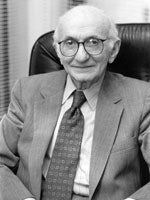Louis Henkin ’40, who pioneered the field of human rights law and was a prolific scholar and teacher in the fields of constitutional and international law, died Oct. 14, 2010. He was 92.
Henkin is often credited with founding the field of human rights law. He established Columbia’s Center for the Study of Human Rights in 1978 and the Human Rights Institute in 1998. His publications and teachings on human rights and international law became essential reading for generations of legal scholars, human rights advocates and government officials. While at Harvard Law School, he served as editor of the Harvard Law Review.
“Lou Henkin’s tireless scholarship, advocacy, and teaching changed not only law and government behavior, but also how people around the world understand the dignity of every person,” said Harvard Law School Dean Martha Minow.
HLS Professor Gerald Neuman ’80, who was elected last month to Human Rights Committee, the premier treaty body in the UN human rights system, said: “Louis Henkin was a giant in the fields of constitutional law and international relations. He was also a uniquely gifted advocate and recruiter for the cause of human rights. His special combination of intellectual rigor and deep normative commitment will be sorely missed.”
Born on Nov. 11, 1917, in what is now Belarus, where his father was a rabbi, Henkin immigrated with his family to the Lower East Side of Manhattan in 1923. Henkin studied mathematics at Yeshiva College, and graduated with a bachelor’s degree in 1937 before applying to Harvard Law School nearly by accident: “One day he saw his roommate filling out an application for Harvard Law School,” according to an account posted by Columbia Law School. “Intrigued, he followed suit.”
During his illustrious career, Henkin clerked for federal appellate Judge Learned Hand and U.S. Supreme Court Justice Felix Frankfurter, earned a Silver Star as a soldier in the U.S. Army during World War II, spent five years at the State Department in the Office of Regional Affairs, a predecessor to NATO, and taught at the University of Pennsylvania and then at Columbia.
Henkin also taught at the Aspen Institute’s Justice and Society Program, which for many years was directed by his wife Alice, a human rights lawyer. According to a report in The New York Times, he taught international law to more than 300 judges, including four future Supreme Court justices, Ruth Bader Ginsburg, Anthony M. Kennedy, Stephen G. Breyer and Sonia Sotomayor.
His books – particularly “Foreign Affairs and the Constitution,’’ “The Rights of Man Today,’’ “How Nations Behave,’’ and “The Age of Rights’’ – helped shape human rights education.
Henkin is survived by his wife, his three sons Joshua, David and Daniel, and five grandchildren.
Obituaries appeared in the New York Times, Wall Street Journal, and on the Columbia Law School web site.
